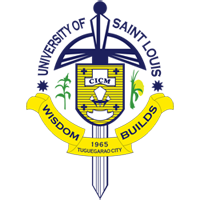
The University of Saint Louis (USL), while given the unprecedented challenges in education posed by the COVID-19 pandemic, expressed solidarity with other educational institutions and groups through its participation in particular webinars and virtual forum and show.
 Heeding to the request of the Commission on Higher Education Regional Office 2 (CHEDRO2) to share to other higher education institutions (HEIs) in the Cagayan Valley region USL’s initiatives on Flexible Learning, the University president, Rev. Fr. Renillo H. Sta. Ana, and VP for academics, Dr. Emmanuel James P. Pattaguan, served as the speakers on the topic last May 27.
Heeding to the request of the Commission on Higher Education Regional Office 2 (CHEDRO2) to share to other higher education institutions (HEIs) in the Cagayan Valley region USL’s initiatives on Flexible Learning, the University president, Rev. Fr. Renillo H. Sta. Ana, and VP for academics, Dr. Emmanuel James P. Pattaguan, served as the speakers on the topic last May 27.
Rev. Fr. Sta. Ana gave the opening prayer, introduction to USL Flexible Learning system, and a background to Home Learning.
Dr. Pattaguan, whose discussion was themed “Flexible Learning: The University of Saint Louis Experience” offered insights into the background and implementation of said learning design in the University.
The VP for Academics emphasized on the University’s subscription to NEO LMS, a commercial learning management system.
He also presented the results of a then ongoing survey conducted for parents, faculty and students on the University’s Flexible Learning modalities for the upcoming school terms then.
CHED Region 2 director, Dr. Julieta M. Paras, as well as some of the webinar participants, thanked USL for its sharing.
For his closing message, Rev. Fr. Sta. Ana expressed appreciation on how USL has served as a “big brother” to other Region 2 schools [through the webinar], further saying that USL will be glad to learn also from other HEIs.
As of writing, CHEDRO2 has been hosting a series of webinars on various topics since May 22 with a live streaming of the sessions on its Facebook page.
Meanwhile, in the virtual event themed “Digital Education Leadership Forum” by Cypher Learning and Abiva Publishing, Inc. on July 17, Dr. Pattaguan discussed “Leading Flexible Learning in Schools” before several educators and other participants.
 In said forum, Dr. Pattaguan affirmed on the institutional use of its present learning management system and presented the different stages USL went through to guide its decisions and actions relevant to the Flexible Learning modalities it now offers.
In said forum, Dr. Pattaguan affirmed on the institutional use of its present learning management system and presented the different stages USL went through to guide its decisions and actions relevant to the Flexible Learning modalities it now offers.
“Flexible Learning is a method or a system allowing every learner in your school to learn in any way possible, in any part of his home, in any part of the province/ place where he comes from, at any given time, in any possible opportunity,” he said to his virtual audience.
The VP for Academics also highlighted the possibility for USL to train teachers of other schools on the use of LMS, as the University “will also explore more opportunities for continuing development programs not only for its teachers but also for the community or society in general.”
Dr. Pattaguan was with other forum speakers who had other similar topics.
Spiritual health this pandemic
Dr. Darin Jan C. Tindowen, head of the Center for Social Innovation, Local Knowledge, and Educational Research (CSILKER), took to the virtual world the importance of spiritual health.
As speaker, he tackled the topic “Spiritual Health amidst Pandemic + Sharing” during the Philippine Teachers Association-Bahrain (PTAB) Webinar last June 26.
Further, he was guest for the same topic during the fourth episode of the “Shout-Out Bahrain” show of the Filipino Institute last August 26. The Filipino Institute is a certification school offering short-term courses for Filipinos and with virtual and physical campuses in the Middle East.
Primed to give advice to Filipinos in Bahrain and other oversees Filipino workers, Dr. Tindowen said, “Don’t waste a crisis. Find something [worthwhile] to do.” He emphasized reconnecting with and renewing one’s faith to God, and reconnecting with one’s family.
“The pandemic is just a challenge…. At the end of the day, our spirituality and faith should still be there. Why? Because we share this strong spirituality and faith to those who need it…. At the end of the day, there’s God who listens to us, there’s God who accompanies us,” he also said mostly in Filipino language.
Dr. Tindowen finished a master’s degree in Religious Education and a bachelor’s in Philosophy and Interdisciplinary Studies.


